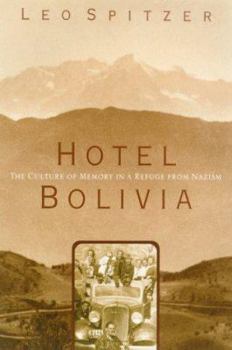Hotel Bolivia: The Culture of Memory in a Refuge from Nazism
Select Format
Select Condition 
Book Overview
In the 1930s, many tens of thousands of people fleeing Nazi-dominated Europe found refuge in Latin America. And in the short, terrifying months between the Anschluss and Kristallnacht in 1938 and the... This description may be from another edition of this product.
Format:Paperback
Language:English
ISBN:0809001756
ISBN13:9780809001750
Release Date:May 1999
Publisher:Hill & Wang
Length:234 Pages
Weight:0.88 lbs.
Dimensions:0.8" x 5.9" x 8.9"
Customer Reviews
2 ratings
Memory is "hard to kill"
Published by Thriftbooks.com User , 24 years ago
As a grand son of jews that also took Bolivia (1910) as a Refuge from the madness of Pogroms in czarist Russia, I was since long ago interested in the following waves of forced jewish inmigration in this country. A soon as I read "Hotel Bolivia....", I commented it with some Austrian friends that live in Tarija, Bolivia to this very day and that came to Bolivia in 1938 in the same conditions as Spitzer's family. They all tell me that his description of that horrible time is very accurate (especially the Austrian pre-emigration period). Tarija is a small Department in the south of Bolivia which borders with Argentina. Here too, many Jews came in their way to Argentina, they were well treated and some stayed the rest of their lives, all of them respected by this community as hard-working and decent people. Some continued their journey to the USA or Argentina. Today, only 3 Jewish families (survivors) remain from that period and I would like to thank Leo Spitzer for a book that preserves a testimony of their lives in an objective and accurate perspective.
Enlightening insight into story of Jewish refugees in Bolivia
Published by Thriftbooks.com User , 26 years ago
When many think of the land locked country of Bolivia, they think of narcotics, Nazi's and natural resources. Few think of Jews. But to Jews fleeing Europe after the Anschluss of 1938, Bolivia was the place about which to think. Bolivia offered a safe haven in a world of closed doors; at least 20,000 Jews found refuge in La Paz, Sucre, Oruro, Cochabamba during the War. Leo Spitzer, a Professor of History at Dartmouth and specialist in cultural memory and gender studies, was born in La Paz in 1939, his parents having just fled their beloved Vienna. His book, Hotel Bolivia, succeeds in providing an enlightening look at the little known story of the Jewish refugee community in Bolivia; and also, for the most part, Spitzer accomplishes his goal to craft a meditation on the nature of individual and collective memories and the ability of people to adapt to their new environment.Through interviews, testimonies, documents, diaries, and recollections, many rendered benign by the passing of time, Spitzer relates to us the stories of the refugees who never felt at home in Bolivia -- people who viewed themselves as refugees and not residents -- perceiving Bolivia as a transit station, a hotel by the name of Hotel Bolivia.In 1938, Bolivia was still recovering from its devastating Chaco War with Paraguay. This Catholic country that was seventy percent Quechua and Aymara-speaking mestizos did know a little about Jews. Its liberator, President Antonio Jose de Sucre, was probably part crypto-Jewish, and Mauricio Hochschild, of German Jewish parentage, was one of Bolivia's wealthiest industrialists. Into this high altitude came over 20,000 Jewish refugees. While most gained entry in order to set up agricultural settlements, just a few hundred ever left the urban center of La Paz for the good earth of cooperative farming. The story of Spitzer's own family's crossing from Genoa to La Paz is engrossing. Although Spitzer's grandfather Leopoldo, for whom he is named, died on the ship en route to Boli! via, the Spitzer family's shipboard photos and recollections are filled with optimism and are devoid of sorrow. Did the passage of time distort their memories? It was not until Spitzer discovered his father's captions on the obverse sides of the photos that he learned of his father's profound sadness of leaving his homeland (Heimat) and his extreme feelings of loss on losing his beloved father and having to bury him during a port call in Caracas. Spitzer sharply quotes journalist Herb Caen's observation, "Nostalgia is memory with the pain removed."Leo, named for his grandfather who had died just a few weeks prior, became a link to the past in this new and alien land. The other refugees recreated several other links to their pasts, including the Circula Israelita, Austria Club, Juedische Jugendbund, Judische Gemeinde, and Macabi socials and sporting clubs. Spitzer shows how the sinking of the refugee ship "Orazio" took on an amplified importance in the refugee






